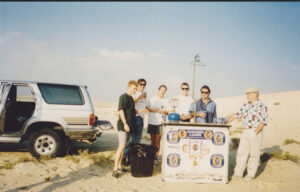I got to attend Tremendicon in Springfield this weekend— always a lot of fun. For those who aren’t familiar, “con” is short for conference, but the ones with “con” in the name, often a “comicon,” are a unique category. By and large, they are based on anime (a form of adult animated television show that originated in Japan). If you’ve ever heard of a “Pokemon” you’ve heard of one of the most popular animes.
always a lot of fun. For those who aren’t familiar, “con” is short for conference, but the ones with “con” in the name, often a “comicon,” are a unique category. By and large, they are based on anime (a form of adult animated television show that originated in Japan). If you’ve ever heard of a “Pokemon” you’ve heard of one of the most popular animes.
Cosplay—costume play—is an important aspect of the cons. Fans put a tremendous amount of time and effort into creating elaborate costumes to dress as their favorite anime characters, or as their own unique characters. (Mine is an evil alien queen, though I didn’t wear it this year.)
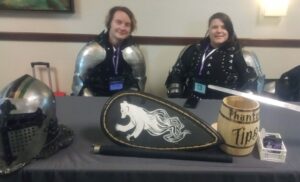
These two ladies are from Phantoms, an all-women armored combat team. It’s all a great deal of fun. You can check them out on Facebook at Phantoms-Women’s Armored Combat. https://www.facebook.com/search/top?q=phantoms-women%20s%20armored%20combat
It’s much more than fun and games, however. Most cons offer a series of seminars and panels covering a variety of topics. Tremendicon is one of my favorite, as it has three or more tracks of seminars geared to writers, gamers, artists, and movie producers.
The first con I ever attended was Planet Comicon in Kansas City. There I attended a physics lecture that greatly impacted my science fiction writing. I’ve also been to comicon seminars on space travel, publishing, and writing. As a science fiction writer, I gain as much useful intel from the cons as I do from writers conferences.
One of the nice aspects of these groups is the atmosphere  of total acceptance. For a weekend, you can be anyone or anything you want, from a mushroom to Iron Man. On the right, Jo Moser was kind enough to pose for me.
of total acceptance. For a weekend, you can be anyone or anything you want, from a mushroom to Iron Man. On the right, Jo Moser was kind enough to pose for me.
 My younger son, Matt, used Tremendicon to check out the progress some fellow game developers had made on their tabletop RPG games and to pick up tips on self-publishing.
My younger son, Matt, used Tremendicon to check out the progress some fellow game developers had made on their tabletop RPG games and to pick up tips on self-publishing.
In the photo above he’s meeting with the developer of a game called Trinamyk. You can check that game out at www.trinamyk.com.
Matt’s tabletop RPG, Calamitas, should be released early next year. You can keep tabs on his progress at www.calamitasrpg.com. Be sure to sign up for his email list so you’ll always get the latest news.
In addition, at Tremendicon you can always count on Lego artists and the Ghostbusters to put on a show, and this year, a zombie car.
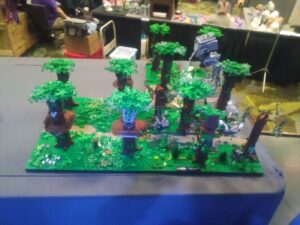

Keep having
fun my friends.


 dash from my bathroom into my bedroom and under the bed. Oh joy. Probable gift giver: Tommy, who comes in the bedroom window at night (so I don’t have to truck all the way to the front of the house to open the door.) We don’t have cat doors, because that would invite raccoons, opossums, and who knows what other kinds of wild critters. Occasionally, he makes it in the window without me realizing he’s got a mouse in his mouth.
dash from my bathroom into my bedroom and under the bed. Oh joy. Probable gift giver: Tommy, who comes in the bedroom window at night (so I don’t have to truck all the way to the front of the house to open the door.) We don’t have cat doors, because that would invite raccoons, opossums, and who knows what other kinds of wild critters. Occasionally, he makes it in the window without me realizing he’s got a mouse in his mouth. Not three hours after discovering the live mouse in my bedroom, I heard Cindy playing rambunctiously in the living room. I thought she had latched onto one of the catnip mice that are scattered around on the floor, but she doesn’t usually pay much attention to them. Becoming suspicious, I got up and got a flashlight and chased her down. She was happily throwing something and chasing after it. Sure enough—not a catnip mouse. Fortunately (for me at least) this one was already dead. She lost her toy.
Not three hours after discovering the live mouse in my bedroom, I heard Cindy playing rambunctiously in the living room. I thought she had latched onto one of the catnip mice that are scattered around on the floor, but she doesn’t usually pay much attention to them. Becoming suspicious, I got up and got a flashlight and chased her down. She was happily throwing something and chasing after it. Sure enough—not a catnip mouse. Fortunately (for me at least) this one was already dead. She lost her toy. any gifts. He has the attitude that the house belongs to him, and he merely tolerates the existence of the rest of us, except for my husband. He’d be very content to be in a one-cat one-human household. He makes his supremacy known to the other two by guarding the hallway and chasing any cat that dares to enter it.
any gifts. He has the attitude that the house belongs to him, and he merely tolerates the existence of the rest of us, except for my husband. He’d be very content to be in a one-cat one-human household. He makes his supremacy known to the other two by guarding the hallway and chasing any cat that dares to enter it.
 These little guys must have a calendar in their heads, though this one was two days early. Normally, I can count on the first one showing up on April 15, and they disappear in unison on October 15. Last fall they left a full two weeks early, prompting me to stock up for what I thought would be a terrible winter. It wasn’t terrible, but we did have two six-inch snows, the most we’ve had since we moved to our sweet country retreat in Southwest Missouri in 1999. While we were trying to build our house, we had two 11-inch snows a week apart. Haven’t seen anything like that since. Figures, since it set our building efforts back by two weeks and cost us a bundle of extra money for the out-of-state construction crew.
These little guys must have a calendar in their heads, though this one was two days early. Normally, I can count on the first one showing up on April 15, and they disappear in unison on October 15. Last fall they left a full two weeks early, prompting me to stock up for what I thought would be a terrible winter. It wasn’t terrible, but we did have two six-inch snows, the most we’ve had since we moved to our sweet country retreat in Southwest Missouri in 1999. While we were trying to build our house, we had two 11-inch snows a week apart. Haven’t seen anything like that since. Figures, since it set our building efforts back by two weeks and cost us a bundle of extra money for the out-of-state construction crew. Conferences like this one always help get me back on track when I’ve fallen off. The hotel, The Orleans, was amazing—biggest one I’ve ever seen (first-hand) let alone stayed in. The first floor was a full casino. My friend Prix, who attended the conference with me, tried her hand at Roulette.
Conferences like this one always help get me back on track when I’ve fallen off. The hotel, The Orleans, was amazing—biggest one I’ve ever seen (first-hand) let alone stayed in. The first floor was a full casino. My friend Prix, who attended the conference with me, tried her hand at Roulette.
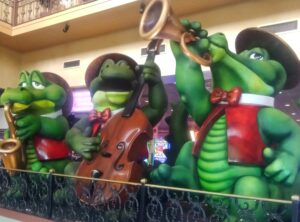 The hotel was largely alligator themed. My favorite bar had a giant alligator head sticking out of the front. I took a photo, but didn’t have my glasses on, so it didn’t turn out well (not because I’d been drinking, you understand). However, this is a pic of my favorite statue at one of the entrances.
The hotel was largely alligator themed. My favorite bar had a giant alligator head sticking out of the front. I took a photo, but didn’t have my glasses on, so it didn’t turn out well (not because I’d been drinking, you understand). However, this is a pic of my favorite statue at one of the entrances. In addition to learning a lot, I had the chance to reunite with my west coast cousins whom I hadn’t seen for over 60 years. We had soooooo much fun. Left to right below, Page, Jan, and me. Can you see the family resemblance?
In addition to learning a lot, I had the chance to reunite with my west coast cousins whom I hadn’t seen for over 60 years. We had soooooo much fun. Left to right below, Page, Jan, and me. Can you see the family resemblance?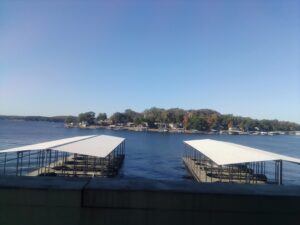

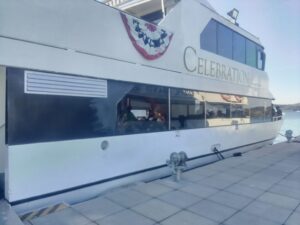


 The picture of Brian’s book with the gas mask is a case in point. Brian was attending University in Queensland, Australia, home for the holidays in Bahrain during the First Gulf War. The Bahrain government had issued gas masks to its citizens in case of an attack from Iraq. The English speaking “ex-pats” in Bahrain were avid partiers, not to be deterred by the threat of attack, so they had “gas mask parties.” Everybody had to bring their own gas mask as well as copious amounts of booze.
The picture of Brian’s book with the gas mask is a case in point. Brian was attending University in Queensland, Australia, home for the holidays in Bahrain during the First Gulf War. The Bahrain government had issued gas masks to its citizens in case of an attack from Iraq. The English speaking “ex-pats” in Bahrain were avid partiers, not to be deterred by the threat of attack, so they had “gas mask parties.” Everybody had to bring their own gas mask as well as copious amounts of booze. At thirteen he managed to convince his parents to allow him to return to Bahrain and attend school there. Before long, however, he heard from a friend that a boarding school in Scotland, aptly named Colditz (after the infamous prison in ‘the Great Escape’) was a pretty good school, and off he went. It didn’t hurt that his grandmother lived in the area. Not that being at a better school changed his behavior much. In Chapter 4: Halfterm Mayhem—Saving the Family Name, the boys spend their school break at a house owned by his ‘unaware’ parents, who were still living overseas. The first night they create a new tradition by getting drunk and jumping off the bridge into the freezing river at 2:00 a.m. The next day, they decide on a toga party, using Brian’s mother’s new sheets, in appropriate colors of bright pink, blue, green, and yellow, and partying on the lawn where the geriatric neighbors are certain to see and report to his grandmother. When they see gran on her way, they sneak out to the local pub, still in togas, of course.
At thirteen he managed to convince his parents to allow him to return to Bahrain and attend school there. Before long, however, he heard from a friend that a boarding school in Scotland, aptly named Colditz (after the infamous prison in ‘the Great Escape’) was a pretty good school, and off he went. It didn’t hurt that his grandmother lived in the area. Not that being at a better school changed his behavior much. In Chapter 4: Halfterm Mayhem—Saving the Family Name, the boys spend their school break at a house owned by his ‘unaware’ parents, who were still living overseas. The first night they create a new tradition by getting drunk and jumping off the bridge into the freezing river at 2:00 a.m. The next day, they decide on a toga party, using Brian’s mother’s new sheets, in appropriate colors of bright pink, blue, green, and yellow, and partying on the lawn where the geriatric neighbors are certain to see and report to his grandmother. When they see gran on her way, they sneak out to the local pub, still in togas, of course.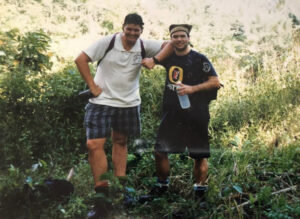 his buddy Firthy head to Thailand. In Brian’s words, “Bangkok is best described as utterly chaotic, think manic beehive with the Queen on her period, shouting orders outrageously drunk and high on LSD. General disorder is the dish of the day.” No spoilers here. I’ll let you read the rest of the story yourselves, and see how the “safe hands” bit works out.
his buddy Firthy head to Thailand. In Brian’s words, “Bangkok is best described as utterly chaotic, think manic beehive with the Queen on her period, shouting orders outrageously drunk and high on LSD. General disorder is the dish of the day.” No spoilers here. I’ll let you read the rest of the story yourselves, and see how the “safe hands” bit works out.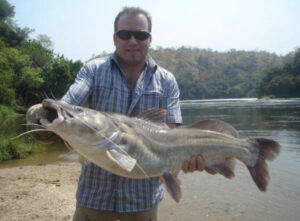 In Uganda, Chapter 40, Two Fools Attempt Croc Suicide—My Favorite Flip Flops, Brian and his buddies hire guides to take them fishing in search of huge Nile Perch on the Nile river, where the crocodiles were larger than their boat. Brian’s friend caught the Perch, but Brian landed this monster catfish. Not sure it couldn’t have eaten the boat.
In Uganda, Chapter 40, Two Fools Attempt Croc Suicide—My Favorite Flip Flops, Brian and his buddies hire guides to take them fishing in search of huge Nile Perch on the Nile river, where the crocodiles were larger than their boat. Brian’s friend caught the Perch, but Brian landed this monster catfish. Not sure it couldn’t have eaten the boat.